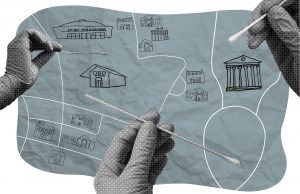
When the University of Mississippi Office of Fraternity and Sorority Life began allowing Greek organizations to host events at the end of February, leadership operated under the university rule that 25% of event attendees would have to get a COVID-19 test. However, FSL is never notified of those results.
“With the asymptomatic testing, we submit this guest list, and then we get back the list of the students that have been randomly selected for asymptomatic testing,” FSL director Arthur Doctor said. “Because of HIPAA rules and health regulations, we are not getting any record of the positive test results.”
The office advises Greek chapters to send FSL a complete guest list at least a week in advance, and those who are chosen to receive an asymptomatic test are required to get their tests during the week of the event. Original guidelines warned organizations that if anyone on the guest list refused to get tested, the event would not take place.
Nonetheless, there is currently no step in the process of asymptomatic testing for events that ensures students who test positive won’t attend. Doctor said FSL has not asked members of Greek chapters to notify the office if they receive a positive test, but some have done so voluntarily. This means it is solely the tested student’s responsibility to report his or her own positive test to their Greek organization if they choose. This also means students can choose to not report positive results at all.
Students are also allowed to schedule their tests on the day of the event they are attending, even though receiving the test results could take up to 24 hours.
“You shouldn’t attend any event if you haven’t gotten your results back, so that’s what we’ve been communicating to our chapters,” Doctor said. “Nothing is perfect, but our system has worked in a way that’s allowed chapters and students to be able to have some social opportunities for the semester. But there’s also all this on the students to report.”
Greek events can now include multiple shifts of 125 members and dates, and members can now bring guests that do not attend the university. Because of the Board of Aldermen’s decision to lift the city’s mask mandate, some events do not require masks once guests are inside the venue.
The university contracts with Premier Medical Group (PMG) to administer the asymptomatic PCR tests, and results become available through the online Sonic MyAccess portal within three to five days after testing.
“When (PMG does) the testing, they do share those results with the health center so that we can log that, and that goes on, of course, the dashboard and the case count page,” director of university health services Alex Langhart said. “‘When a positive case is reported to the university, the contact tracing team is notified of those positives, and then they then reach out to that positive case.”
Langhart said that the contact tracing team typically begins the tracing within a couple of days after the positive test. However, in one case, it has taken up to 20 days for the process to begin.
Before contact tracing begins, though, Langhart said a PMG employee named Ashley Thompson contacts all patients who test positive on the day following their tests. Thompson said she was unavailable to explain the policies for notifying patients of their positive results over the phone prior to publication.
The notification process could include text messages or phone calls, but if a patient doesn’t answer, voicemails or messages including the positive test results would not be sent.
“As part of HIPAA and privacy regulations, you want to make sure that any PHI — so patient health information — is secure. So for instance, if you were tested at the health center and we contacted you, we would not be able to text or or email you that information. We would have to call you,” Langhart said. “That would be potentially why either they wouldn’t leave a voicemail or include in the text message your actual results, just in case that it was compromised and put your health information at risk.”
Langhart said he was not sure if PMG or the university requires confirmation from patients that they have received the positive test result before ceasing attempts to contact them. This means that if patients do not pick up the phone when PMG calls or do not call the number back, they could not receive notification of their positive results.
“I’m honestly not sure. I do know that they attempt as many times as they can and then move on since they have so many that they have to get through,” he said.
Additionally, PMG is a different company from the one that the university contracted to handle asymptomatic testing during the fall semester. The previous company, TourHealth, used rapid tests that would have available results within several hours instead of up to a day for the PCR tests.
According to Langhart, the university made the switch partially due to financial reasons.
“(It) was a state contract company, and then just due to finances and some other things, we just made the switch,” he said. “It just seemed like a better fit for our spring semester with what we needed to accomplish.”
The university’s asymptomatic testing center currently has the capability to test up to 500 people each week, but the average turnout is lower, according to Langhart. Still, with the university requiring testing for events, the number of people getting asymptomatic tests on campus has been higher this spring than it was in the fall.
For the past two weeks, testing has been available on Mondays and Tuesdays from 1 p.m. to 5 p.m. and Wednesdays from 8:30 a.m. to 12 p.m. at the University-Oxford Depot. Updated testing times can be found on the university’s COVID-19 webpage, and appointments can be made through the COVID-19 testing intake form.


























